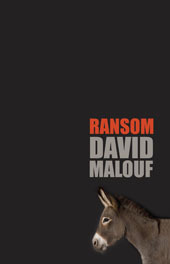
The Blurb (from Goodreads):
A reimagination of one of the most famous stories in all of literature-Achilles's slaughter and desecration of Hector, and Priam's attempt to ransom his son's body in Homer's "The Iliad"-Ransom is the first novel in more than a decade from David Malouf, arguably Australia's greatest living writer.
A novel of suffering, sorrow, and redemption, "Ransom "tells the story of the relationship between two grieving men at war: fierce Achilles, who has lost his beloved Patroclus in the siege of Troy; and Priam, king of Troy, whose son Hector killed Patroclus and was in turn savaged by Achilles. Each man's grief demands a confrontation with the other's if it is to be resolved: a resolution more compelling to both than the demands of war. And when the aged father and the murderer of his son meet, "the past and present blend, enemies exchange places, hatred turns to understanding, youth pities age mourning youth."
My Thoughts:
I am currently writing a novel set in Greece during World War II. As part of my research, I like to immerse myself deeply in the stories, myths and poems of my setting, and so have been reading a lot of Sappho and Homer, as well as books inspired by their works. Ransom is a slight, delicate, sensitive book inspired by just one scene in The Iliad.
In the original poem – thought to have been composed ten centuries ago – the great Greek warrior Achilles grieves the death of his friend and companion Patroclus at the hands of the Trojan hero, Hector. Every morning, he tied Hector’s dead body behind his chariot and dragged him at full speed around his dead friend’s tomb, but every morning the broken and ravaged corpse lies as if untouched. At last, after twelve days, Hector’s father King Priam goes to the Greek war camp, kneels at Achilles’s feet, and offers to ransom his son’s body. It is a scene of extraordinary humility, grace and forgiveness that delivers the true message of this famous poem of rage and masculine violence: the horror and futility of war.
David Malouf takes this scene and reimagines it from the point-of-view of the ageing Priam, whose son lies dead and desecrated in the dust. His grief for his son and Achilles’s grief touch for just a moment, and open up a space for understanding, compassion, sorrow and a kind of quiet redemption: Words are powerful. They too can be the agents of what is new, of what is conceivable and can be thought and let loose upon the world.
David Malouf’s writing is so spare and lyrical, Ransom almost reads like a poem in itself, like an extension of the original Homer. A really beautiful and unusual book.
You might also like to read my review of The King Must Die by Mary Renault:
https://kateforsyth.com.au/what-katie-read/book-review-the-king-must-die-by-mary-renault

